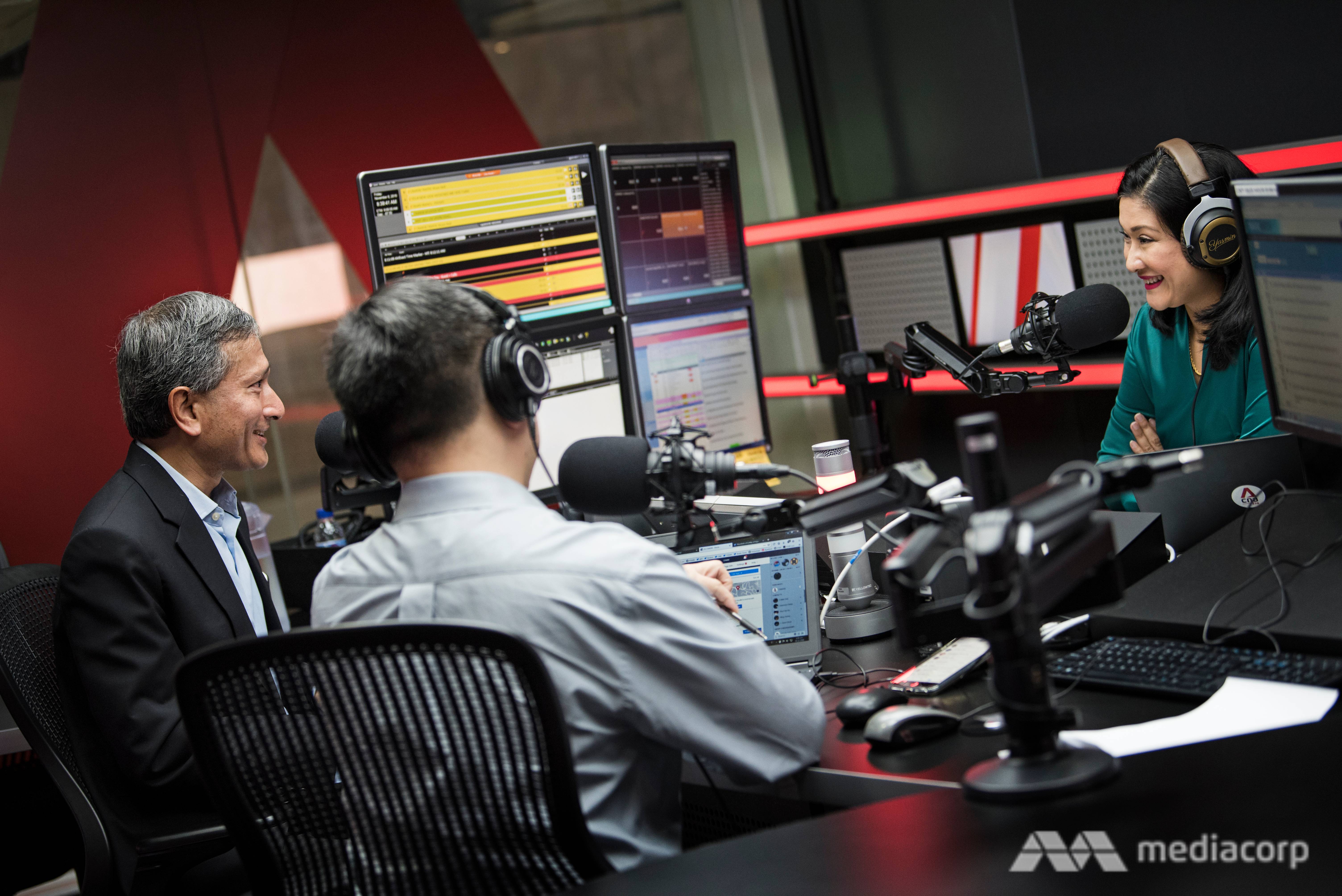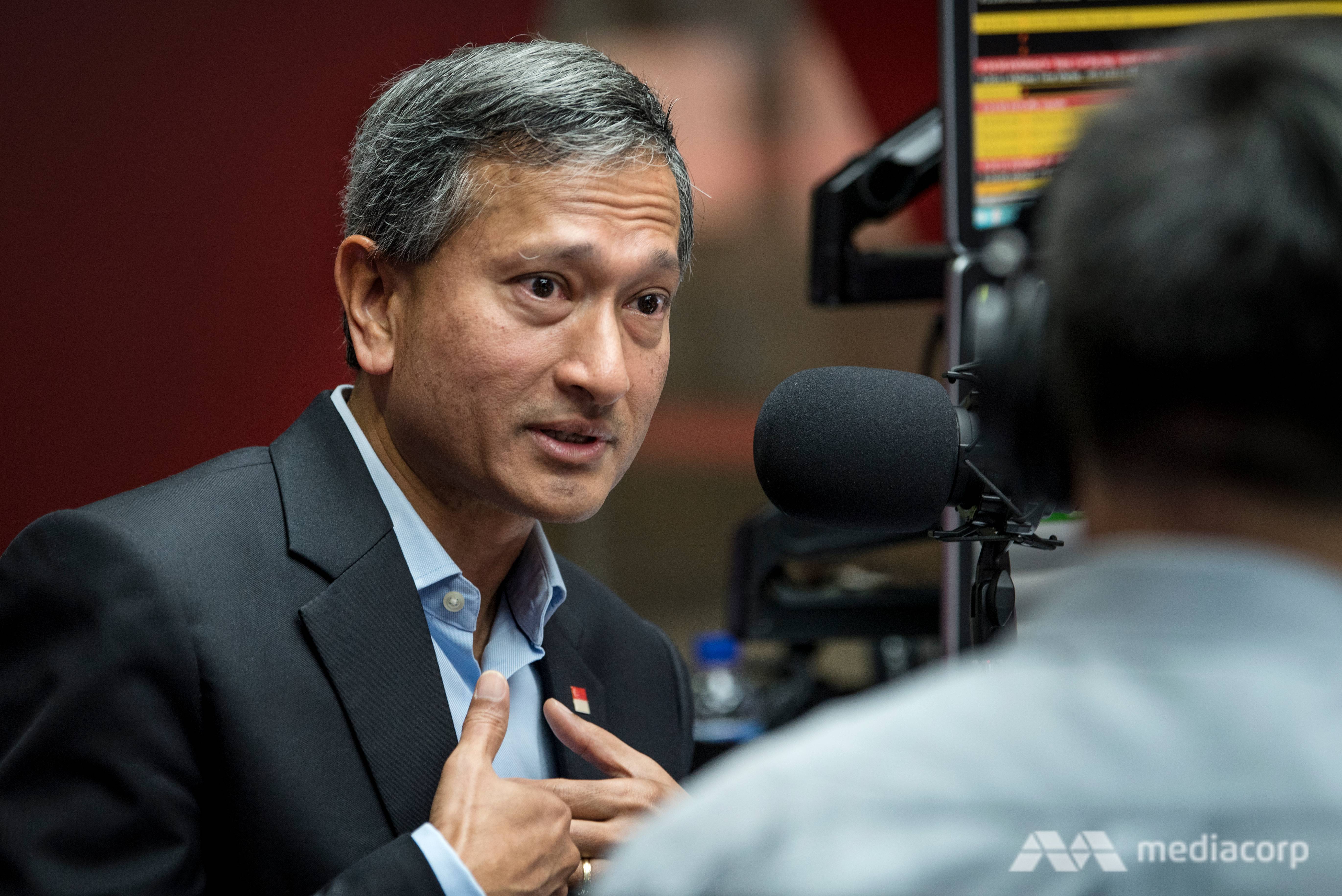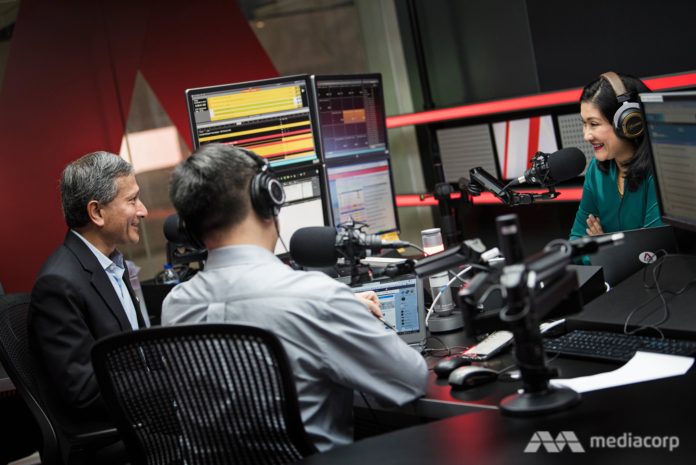SINGAPORE: “Good progress” is being made on the the Johor Bahru-Singapore Rapid Transit System (RTS) Link project, said Singapore’s Foreign Minister Vivian Balakrishnan, though the Malaysian government needs “further time to restructure or review some details”.
“I’m glad to report that we seem to be making good progress on the RTS,” said Dr Balakrishnan during an interview with CNA938 on Friday (Nov 8).
“(The Malaysian government has) indicated they still need further time to restructure or review some details of the plan, but I’m still hopeful that we will go forward.”
The RTS is set to connect Bukit Chagar in Johor Bahru to Woodlands in Singapore, serving 10,000 passengers per hour each way. It was meant to be completed by 2024, but is now behind schedule.
The project was suspended in May at the request of Malaysia, which had to pay abortive costs amounting to around S$600,000.

Minister for Foreign Affairs Vivian Balakrishnan speaks to CNA938’s John Yip and Yasmin Jonkers on Nov 8, 2019. (Photo: Hanidah Amin)
On Oct 31, Malaysian Prime Minister Mahathir Mohamad announced that Malaysia would proceed with the construction of the RTS Link project, but with a 36 per cent cost cut.
However, Malaysia then asked for an extension of the suspension period until Apr 30 next year, according to Singapore’s Transport Minister Khaw Boon Wan.
Mr Khaw’s Malaysian counterpart Mr Anthony Loke said the third suspension period is not to review whether the project should proceed, but to ensure that the relevant agreements can be amended and signed.
RELATIONSHIP WITH MALAYSIA “WILL ALWAYS BE COMPLEX”
Dr Balakrishnan also commented on another project that has been delayed, the Kuala Lumpur-Singapore High-Speed Rail (HSR).
“On HSR, they have until May next year to make up their minds. We will wait for them,” he said.
The two countries in September 2018 decided to postpone construction of the HSR to end-May 2020, with Malaysia having to pay Singapore S$15 million for costs incurred in suspending the project.
Dr Mahathir in October said that the HSR would be “postponed for two years” as Malaysia could not afford the “high costs”.
“It’s worth remembering,” the minister pointed out, “that both the RTS … and the HSR … were in fact ideas that originated from the previous Malaysian government.
“So should we have been surprised that the new government … needed time to review these projects? No, I’m not at all surprised.”

Minister for Foreign Affairs Vivian Balakrishnan in an interview with CNA938 on Nov 8, 2019. (Photo: Hanidah Amin)
Dr Balakrishnan said Singapore’s relationship with Malaysia “will always be complex”, adding that as permanent neighbours, the two countries’ “futures are intertwined”.
He spoke of the “fairly tense argument” the two countries had had in the past year pertaining to maritime boundaries, air space and the use of Seletar Airport.
“Fortunately, fortunately, wiser heads prevailed. Fortunately, we’ve got good and strong relations, and ability to communicate at a very senior leadership level. So we’re able to overcome misunderstandings,” he said.
INDIA EXITED RCEP “FOR DOMESTIC, POLITICAL REASONS”
Commenting on India’s exit from the Regional Comprehensive Economic Partnership (RCEP) agreement, Dr Balakrishnan said: “I cannot speak for India, but my assessment is that they did so for domestic, political reasons.”
READ: What is the RCEP trade deal and what happens now?
Commentary: India’s RCEP exit is a setback, but not a disaster
With India dropping out, the RCEP now comprises 15 countries with a combined 29 per cent share of world GDP and population of 2.1 billion people. It brings together a diverse range of countries, from developing economies in Southeast Asia to global powerhouses such as Japan, Korea and China.
While India can join the RCEP later and other countries – notably Indonesia and Japan – have been lobbying hard for India to stay, Prime Minister Narendra Modi was emphatic about rejecting terms the other members had agreed on.
Its biggest concern? A wave of cheap goods from China and elsewhere.
Commentary: Why India walked away from Asia’s mega free trade deal
Dr Balakrishnan said India’s exit from the RCEP illustrates his belief that “foreign policy, diplomacy, free trade agreements must begin at home”.
“Your own people must be assured that they are competitive … If your own people do not have that confidence, they’ll be very nervous about entering free trade agreements.”
He added: “I think in the case of India, they felt that they were not yet ready to compete on the global stage.
“Now, that’s for them to decide. But what’s important is that Singaporeans need to understand that that is why we are so focused on restructuring our economy, so focused on reforming our education systems, so focused on SkillsFuture and enhancing productivity.”





